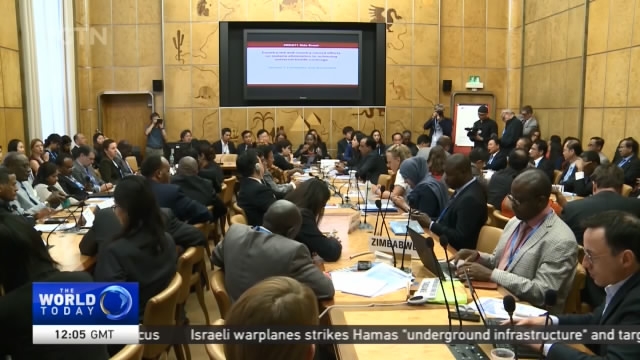
20:34, 23-May-2018
2018 World Health Assembly: Global malaria prevention at a crossroads
03:24

The 71st World Health Assembly is taking place right now in Geneva, where some technical subjects are being discussed by Member States. On the sidelines, China teamed up with Sri Lanka and Myanmar, co-hosting an event focusing on malaria elimination, as the world is at a crossroads in preventing the disease. Xue Jingmeng has more.
According to the World Malaria Report in 2017, progress against the disease has stalled, after seeing global success in control. There were some 5 million more malaria cases in 2016 than in 2015. And deaths from the disease stood at around 445-thousand, a similar number to the previous year. While the rate of new cases had fallen overall, the trend actually levelled off and even reversed in some regions since 2014.
TEDROS ADHANOM GHEBREYESUS, DIRECTOR-GENERAL, WORLD HEALTH ORGANIZATION "We are seeing we are at a crossroad. And the progress stops. So we are seeing we should do something. And one of the challenges will be funding. We are likely to make our best to change the current situation."
The African Region continues to bear some 90 percent of all malaria cases and deaths worldwide. A major problem is a shortage of funds, resulting in major gaps in the coverage of insecticide-treated nets, medicines, and other life-saving tools.
The WHO calls for reductions of at least 40% in malaria case incidence and mortality rates by the year 2020. And China has become one of the 21 countries in the world that plan to achieve the goal of eliminating malaria by 2020.
During the event on malaria elimination at the World Health Assembly, Chinese Vice Minister of the National Health Commission Cui Li shared the country's core interventions in malaria elimination, a working approach known as 1-3-7.
CUI LI, VICE MINISTER, CHINA'S NATIONAL HEALTH COMMISSION '1' means within one day – whereby all malaria cases must be reported to authority. '3' means within three days -- all reported malaria cases should be confirmed at the county level to verify the origin of the cases. '7' means within 7 days, the outbreak focus should be investigated, and vector control and health promotion measures must be implemented. At present, some of China's artemisinin drugs have been pre-certified by WHO. China's long-lasting mosquito nets have entered the global fund procurement catalog. China will provide the world with cost-effective malaria control products, which will certainly be a global malaria eradication initiative, and make new contributions to the world."
Cui said China is ready to work with the international community to increase support for the prevention and control of malaria in developing countries, and to actively contribute to global elimination. China and Southeast Asian countries like Myanmar, Laos, Cambodia, Thailand and Vietnam also signed the Ministerial Call for Action to eliminate malaria in the Greater Mekong Subregion before 2030.
Xue Jingmeng,CGTN.

SITEMAP
Copyright © 2018 CGTN. Beijing ICP prepared NO.16065310-3
Copyright © 2018 CGTN. Beijing ICP prepared NO.16065310-3